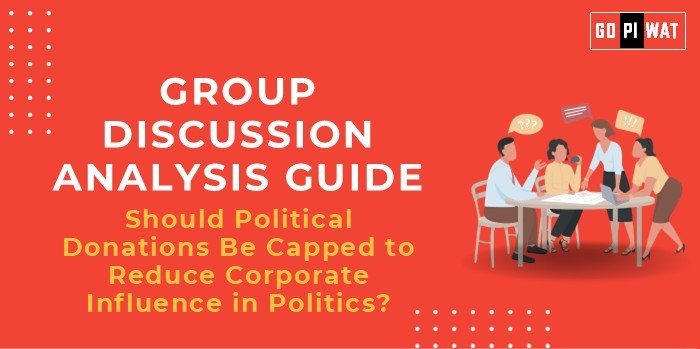📋 Group Discussion Analysis Guide: Should Political Donations Be Capped to Reduce Corporate Influence in Politics?
🌟 Introduction to the Topic
Political donations significantly influence the functioning of democratic systems, shaping policies and election outcomes. The debate over capping political donations to curb corporate influence is highly relevant in the global discourse on governance and democracy.
Political donations are essential for funding election campaigns, yet their unrestricted nature often results in excessive corporate sway over public policies. Several countries, including the US and the UK, have enacted reforms to regulate campaign financing, highlighting the significance of this issue.
📊 Quick Facts and Key Statistics
- 💰 India’s Political Donations: 80% of donations to political parties in 2023 came from corporate entities, according to ADR.
- 🇺🇸 Global Examples: The US enforces contribution caps under the Federal Election Campaign Act (FECA).
- 💵 Election Funding: Public funding is the primary source in countries like Germany.
- 🏦 India’s Electoral Bonds: Over ₹12,000 crore transacted since 2018, often criticized for opacity.
👥 Stakeholders and Their Roles
- 📜 Political Parties: Depend on donations for campaign funding.
- 🏢 Corporates: Influence policy outcomes through contributions.
- 👩👩👦👦 Citizens: Bear the brunt of policies swayed by vested interests.
- ⚖️ Election Commission and Judiciary: Enforce transparency and fairness in campaign finance.
✅ Achievements and Challenges
🏆 Achievements:
- 📖 Transparency: Increased transparency with initiatives like Electoral Bonds (India).
- 🌍 Public Funding: Systems in countries like Germany reduce corporate dependence.
⚠️ Challenges:
- 🕶️ Opacity: Electoral Bonds in India lack disclosure norms.
- ⚖️ Inequity: Smaller parties struggle for funds compared to well-established ones.
- 🌐 Global Comparisons: Nations like Sweden cap donations to ensure fairer elections, but India has no such caps.
📌 Structured Arguments for Discussion
- 🔹 Supporting Stance: “Capping donations will ensure elections remain fair and accessible, reducing corporate interference.”
- 🔹 Opposing Stance: “Donation caps may limit political parties’ ability to reach voters effectively, potentially stifling democracy.”
- 🔹 Balanced Perspective: “While capping donations promotes fairness, ensuring transparency in funding is equally critical for reducing undue influence.”
🔍 Effective Discussion Approaches
- 📈 Opening Approaches:
- “Given that 80% of political funding in India is corporate-driven, should democracy rely so heavily on a few wealthy entities?”
- “Globally, donation caps have curbed undue influence. Can India adopt similar practices?”
- 🔄 Counter-Argument Handling:
- Acknowledge: “Funding is crucial for campaigns.”
- Rebut: “Transparency and innovative funding mechanisms like public funding can bridge this gap.”
📈 Strategic Analysis of Strengths and Weaknesses
- ✅ Strengths: Encourages fair play, reduces policy bias, global precedence.
- ⚠️ Weaknesses: May limit resource availability for campaigns.
- 🌟 Opportunities: Digital crowdfunding, regulatory innovations.
- ⚡ Threats: Circumvention of caps through indirect channels.
🎓 Connecting with B-School Applications
- 💡 Real-World Applications: Exploring transparency in financial systems and its governance implications.
- 💬 Sample Interview Questions:
- “Should India adopt public campaign financing to curb corporate influence?”
- “How can technology enhance transparency in political donations?”
- 📘 Insights for B-School Students: The topic links to ethical governance, resource allocation, and political marketing.


